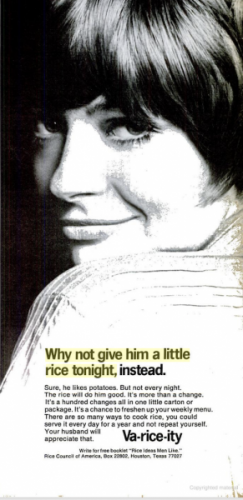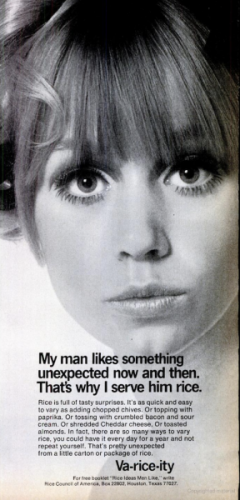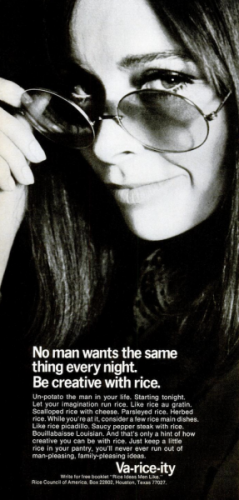11 “Rice Ideas Men Like”
The Language Highlighting the Treatment of Women in 1970’s Advertising
Asha Gandhi
Introduction
In 1969, the Houston-based Rice Council of America (the RCA) launched an advertising campaign for a book of recipes called “Rice Ideas Men Like,” in the magazine LIFE. These ads were targeted at women, suggesting one could ignite her husband’s interest in her just by serving dishes featured in the advertised book. On top of including sensual photos of women as the faces of the campaign, this message was brought front and center through peppering suggestive, inviting language throughout the ads. A campaign like this might shock Americans today, but media propagating restricting attitudes towards women would not have been considered out of place that long ago. In the early 1970s, objectifying women and reducing them to one-dimensional figures was much more of an everyday occurrence than it is now, only fifty years later. The “Rice Ideas Men Like” campaign relied on the belief that one’s feminine inclination to please others was more motivating to a woman than her personal desires. Building on the assumption that one’s sexuality defined her, these ads ultimately suggested that women only thrived when they based decisions on how men viewed them.

Each ad that was part of the “Rice Ideas Men Like” campaign is half a page, vertical. There’s a headline in bold at the top, written in a woman’s point of view. The booklet of recipes being promoted is mentioned at the bottom of the page. All this text is superimposed over a suggestive black-and-white photo of a young woman. The photo closely zooms in on the subject as she glances at the camera. These ads work because they rely on the assumption that the target audience wants to be just like these women. Their facial expressions beg viewers to ask how they can be irresistible to men too. While the success of the images in these ads depended on the assumption that a target viewer cared more about pleasing her husband than her own dreams, the language brings home its sexualization of women like her.


Analysis
Warm, suggestive headlines such as “Why not give him a little rice tonight, instead,” [1] and “No man wants the same thing every night. Be creative with rice,” [2] establish the ads’ initial connection between serving dishes including rice and sex appeal. These phrases make an association between attempting to make rice the star of a meal and being able to impress men with one’s culinary skills. The viewer feels invited to take initiative towards doing all she can to lead her husband on, presumably because seduction is the only way women can successfully take initiative. She also feels secure in herself because she doesn’t need to step out of the role society has pigeonholed her into as an affluent, presumably Caucasian woman to continually impress her husband.
In two of the three ads I’ve selected, these headlines are followed by phrases like “Un-potato the man in your life,” [3] and “The rice will do him good.” [4] Phrases like this initially seem to suggest that once she’s internalized earlier messaging, a target viewer can make her partner’s evening by serving rice for a change. Yet when put in context with other components of these advertisements, this language suggests that trying to please one’s husband just by serving rice will make a woman not only feel like a competent homemaker but also desirable. This leading message is later bookended by language directing the viewer back to what the ad was not just saying at the beginning, but trying to show her all along. The messaging reinforced at the end of these ads could easily convince someone she wanted to buy “Rice Ideas Men Like” because making the included recipes would guarantee that she would ultimately feel secure in her current relationship. Exuberant ploys specifically written so people wouldn’t question them like “Just keep a little rice in your pantry, you’ll never run out of man-pleasing, family-pleasing ideas,” could lead her to buy a cookbook if she believe it would help her keep her partner happy with how their relationship was going. [5]
These ads also hone in on describing all the appetizing things one can do with rice. This is where quotes like “Un-potato the man in your life” begin to make sense. A variety of flavorful ways to serve rice is listed in a quick, laid-back succession (“It’s as quick and easy to vary as adding chopped chives. Or topping with paprika. Or tossing with crumbled bacon and sour cream. Or shredded Cheddar cheese. Or toasted almonds.”) [6] This quotation not only sounds pleasing to the ear but draws one’s attention to the rich things one can do with rice, and a refined taste can easily be associated with an inherent attractiveness.
The quotations like the one above make preparing rice in a variety of different ways sound effortless. This further contributes to the idea that serving one of the RCA’s recipes will make someone seem more attractive, it propagates the idea that a woman performing domestic tasks quickly and effortlessly is attractive. It makes her look like she’s always ready to drop everything to meet her partner’s every need. This viewpoint casts women as extensions of their significant others, assuming that they do not have agency over their own lives. On top of that, they appear to have such little sense of self-worth they would never prioritize their own needs over their partner’s. These stereotypes reduce a woman’s role in a relationship to a glorified servant, objectifying her.
The ads’ emphasis on the variety of recipes found in “Rice Ideas Men Like” showed how rice’s versatility can add the “something unexpected” that a man supposedly wants out of both meals and his personal life, according to the ad run in January 1970 with the headline “My Man Wants Something Unexpected Every Now and Then. That’s Why I Serve Him Rice.” Changing up one’s usual menu to include rice dishes new to the cook and making meals including rice with a variety of savory textures and flavors is described as simple and convenient throughout the campaign. For instance, being served rice for dinner when one is usually given potatoes is referred to as “a hundred changes all in one little carton or package,” [7] perhaps when one continues to prepare it in a variety of mouthwatering ways.
This actually highlights more than the supposed diversity in the recipes found in the pamphlet that’s being advertised. Rice’s convenience isn’t just presented as nice for the cook, but as something that will add to her sexual appeal. These ads do more than perpetuate the belief that a girlfriend or wife is defined by how submissive she is as well as her ability to look after her partner’s physiological needs. The RCA’s emphasis on how convenient experimenting with rice can be also projects the variety found in “Rice Ideas Men Like” on who the cook is as a person. The assured, inviting language used to publicize the diversity in the pamphlet being advertised gives the impression that the RCA has given women permission to carry themselves with more confidence in how they appear to men with their ads. However, this permission didn’t come from a consumer picking up “Rice Ideas Men Like” just because she wants to try the recipes in it herself.
It apparently seemed more to come from these advertisements telling female viewers that using the RCA’s booklet for dinner inspiration will not only please but impress the men in their lives, supposedly the most valuable boost to self-esteem a woman could get from following a recipe. While assumptions like these acknowledge women’s sex drive and autonomy, they simultaneously undermine women’s sense of themselves as self-reliant, complex people. Such portrayals of women additionally fsend female viewers the message that they are one-dimensional, ultimately defined by the roles they play in men’s lives.
Asha Gandhi is a second-year student at Wake Forest University.
- ”Why Not Give Him A Little Rice Tonight, Instead,” LIFE, Oct 3, 1969, p. 19 ↵
- ”No Man Wants the Same Thing Every Night. Be Creative With Rice,” LIFE, Mar 13, 1970, p. 18/ ↵
- Ibid. ↵
- ”Why Not give Him A Little Rice Tonight, Instead.” ↵
- ”No Man Wants the Same Thing Every Night. Be Creative With Rice.” ↵
- ”My Man Likes Something Unexpected Now And Then. That’s Why I Serve Him Rice,” LIFE, Jan 30, 1970, p. 19 ↵
- ”No Man Wants the Same Thing Every Night. Be Creative With Rice.”/ ↵

